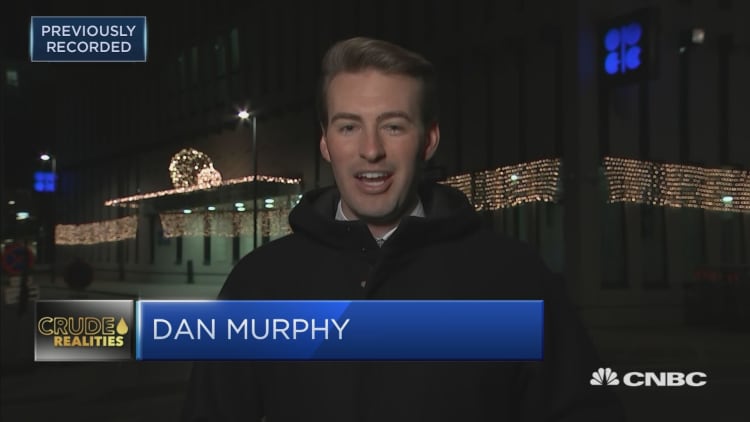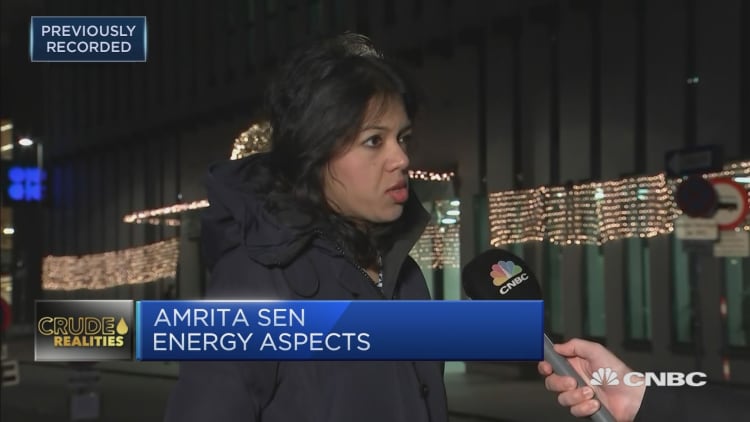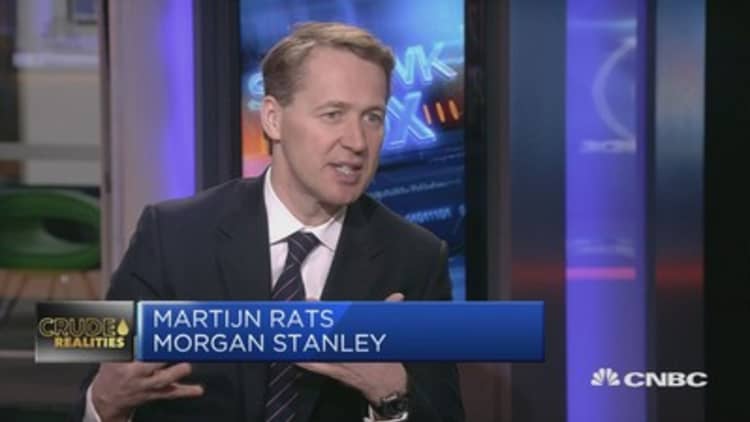
An upcoming meeting between OPEC and non-OPEC allies could see the group deepen oil production curbs, energy analysts told CNBC, although an extension of existing cuts and an emphasis on stricter compliance is still seen as the most likely outcome.
OPEC members will host a meeting in Vienna, Austria on Thursday to discuss the next phase of their oil production policy. The 14-member group will then hold talks with non-OPEC allies on Friday.
The wider group, sometimes referred to as OPEC+, has reduced output by 1.2 million barrels per day (b/d) since the beginning of the year. The current deal, which runs through to March 2020, replaced a previous round of production cuts that began in January 2017.
"I think there is a possibility that we see around 400,000 barrels per day deeper cuts," Amrita Sen, chief oil analyst at Energy Aspects, told CNBC's Dan Murphy in Vienna on Wednesday.
"Saudi Arabia is definitely keen to surprise the market to the upside," Sen said, but cautioned deeper production cuts had "definitely not been firmed yet."
International benchmark Brent crude traded at $62.93 on Thursday morning, down around 0.1%, while U.S. West Texas Intermediate (WTI) stood at $58.29, down more than 0.2%.
Oil prices have rallied in recent trading sessions, boosted by intensifying speculation about the potential for deeper production cuts. However, Brent crude futures remain around 15% lower when compared to an April peak, with WTI down 12% over the same period.
"The physical market is extremely tight. I don't think OPEC need to deepen cuts, however, the problem is sentiment is very weak," Sen said, citing persistent concerns about demand amid an ongoing U.S.-China trade war.
Compliance quotas
OPEC kingpin Saudi Arabia is likely to push for a policy that would drive crude futures higher in order to help balance its budget and support pricing for the partial stock listing of state producer Saudi Aramco.
The initial public offering (IPO), which could be the world's biggest, will be priced on Thursday.
Right here, right now, the oil market is in decent shape. It is not far off balanced.Martijn RatsChief Oil Analyst at Morgan Stanley
On Monday, Reuters reported that Riyadh wanted to deliver a positive surprise to the market before the listing of Aramco, citing two sources familiar with the matter. The report indicated OPEC+ would add at least 400,000 b/d to the current deal.
Iraqi Oil Minister Thamer Ghadhban has also publicly suggested OPEC members were leaning toward approving deeper oil cuts this week.
However, Russia has so far been opposed to deeper cuts — as well as an even longer extension of output curbs.
A key OPEC ally, Moscow has typically adopted a tough stance before every meeting, with Saudi officials once again reportedly working to convince their Russian counterparts to approve a policy designed to prop up prices.
"I think the main focus of this OPEC meeting is actually going to be compliance — even more than whether they deepen cuts or not," Sen said.
"Even if there are deeper cuts, I think they will be conditional on these laggards actually upping compliance. Now, of course, that is very difficult to enforce," she added, referring to Iraq, the United Arab Emirates and Nigeria.

Saudi Arabia has frequently called on Iraq and Nigeria, both fellow members of OPEC, to improve their respective compliance quotas. It is thought that both countries falling in line with the output curbs could provide an extra reduction of up to 400,000 b/d.
"I do not believe they are going to implement further production cuts, but they are going to make a special point on stricter compliance," Tamas Varga, senior analyst at PVM Oil Associates, told CNBC via telephone.
The OPEC meeting with non-OPEC ministers on Friday will most likely "just confirm their co-operation. It is in the interests for both to manage the market."
Downside risks
The actions of OPEC+ has frequently drawn the ire of President Donald Trump, who has often lashed out and demanded Saudi Arabia impose policies to lower oil prices.
In recent months, Trump has remained silent on OPEC.
"Right here, right now, the oil market is in decent shape. It is not far off balanced," Martijn Rats, chief oil analyst at Morgan Stanley, told CNBC's "Squawk Box Europe" on Friday.
"But if you look a little further into the future to the first and second quarter of next year, it looks increasingly likely that we will have to deal with quite considerable oversupply — at least if OPEC maintains its current output."

When asked whether investors should brace for serious downside risks next year, Rats replied: "Well, a lot depends on the OPEC meeting that is coming up."
"If OPEC were to decide to sort of broadly maintain current levels of output, yes. ... The way it currently looks to us is that the first half of next year looks problematic," Rats said.





